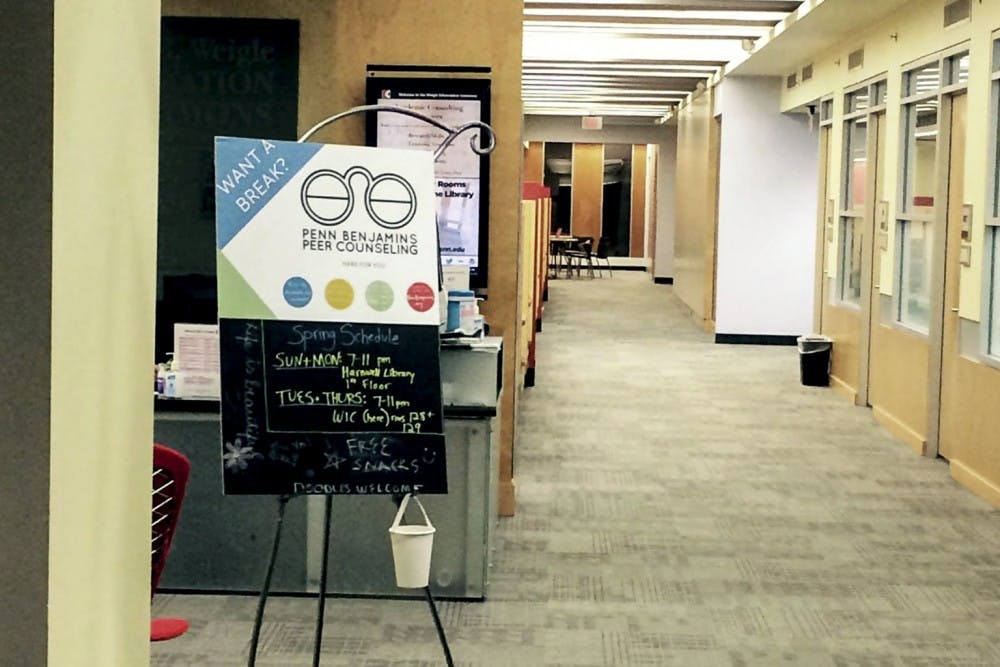
Penn Benjamins increase their hours for one-on-ones and group sessions following the recent events of Olivia Kong's death. The group hosts Penn’s first and only in-person peer counselor | Courtesy of Emily Derecktor
Many students suffering from academic stress or personal issues are looking for someone to talk to. Penn Benjamins, which was founded last spring, hopes to provide just that — and after last week’s suicide, they’ve ramped up their activity.
Penn Benjamins Peer Counseling is Penn’s first and only in-person peer counseling organization, its counselors lovingly referred to as “Bens.” The group offers comprehensive yet casual peer counseling and referral services to undergraduates. In the wake of Wharton junior Ao “Olivia” Kong’s suicide last Monday, Penn Bens lengthened their counseling hours and set up group sessions for students suffering from grief. Both individual students and groups alike have contacted Penn Bens to discuss Kong’s death, the 10th suicide at Penn since February 2013.
College junior Roy Lan helped found the organization, along with College seniors Emily Derecktor and Diego Fiori and 2015 College graduate Jordan Lidsky-Everson. It was founded in part due to the string of student suicides at Penn over the last few years.
“I personally became involved after a number of my close friends and acquaintances began complaining about the resources available to students at the time,” he said. “After doing a bit of research and asking the heads of other peer counseling groups at other schools about how to start a similar organization, I saw an opportunity to start a peer counseling group here at Penn. I was in close contact with President Amy Gutmann, who helped connect me to a group of other students interested in the initiative, as well as the head of CAPS, Bill Alexander.”
College freshman Max Schechter decided to apply for a position as a counselor after his first semester at Penn.
“I realized how important it is to have a peer support system or even just somebody there to listen to you,” he said. “By simply being there and lending a pair of ears, we have the power to help so many people. Just by being heard, we can feel validated, work through solutions and begin to feel better.”
Schechter is among 40 students who have recently undergone counselor training. During training sessions, new Bens are taught active listening skills and a model for problem solving, and they learn about resources on campus and how to refer students to them.
They also complete mock interactions each week in order to practice approaching various types of conversations. Schechter described them as first being “awkward and challenging to maintain but eventually more natural.”
Through one-on-one conversations, Bens hope to validate the feelings and experiences of peers in a comfortable, friendly space — free snacks and coffee are also provided.
Bens also refer students to other resources when they think they are not equipped to fully give them the support they need.
“The question of when to refer a student to adult professionals honestly happens on a case-by-case basis,” Lan said. “But we tend to err on the side of caution if we feel that our abilities cannot meet the needs of our peers.”
A Wharton sophomore said that she found the support she needed in Bens counseling that kept her from “making a stupid decision.”
“I was contemplating self-harm and I was really just in a dark place,” she said. “Just talking helped so much and I think other students should take advantage of it.”
The group hopes to grow to about 60 members by the spring of next year. Penn Bens currently operates from 7:00 p.m. to 11:00 p.m. on Sundays and Mondays in the Harnwell library and Tuesdays and Thursdays in Van Pelt Weigle Information Commons rooms 128 and 129.
The Daily Pennsylvanian is an independent, student-run newspaper. Please consider making a donation to support the coverage that shapes the University. Your generosity ensures a future of strong journalism at Penn.
DonatePlease note All comments are eligible for publication in The Daily Pennsylvanian.







